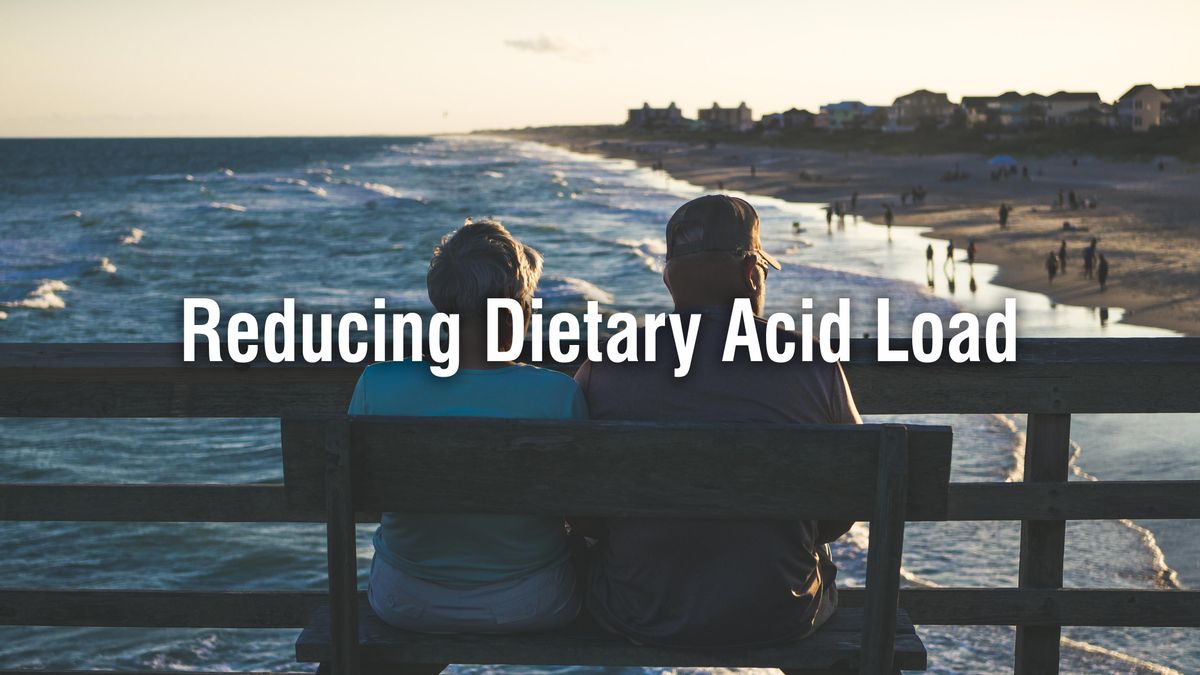
(下篇)
另一個動物性蛋白會損害腎功能的原因是:動物性蛋白通常偏酸性。這是因為動物性蛋白往往具有較高的含硫胺基酸(例如甲硫胺酸),會在體內代謝時產生硫酸。相反的,水果和蔬菜一般都是鹼性食物,有助於中和腎臟裡頭的酸。[1]
膳食酸負荷是由酸性食物(如肉、蛋和乳酪)和鹼性食物(水果和蔬菜)的平衡所決定的,吃蔬果等鹼性食物可以對酸負荷產生緩衝作用。2014 年,一項對全美超過一萬兩千名美國人的飲食和腎功能所做的的分析發現,膳食酸負荷越高,蛋白質滲漏進尿液(腎臟受損指標)的風險就越高。[2]
遠古人類的飲食主要以植物為主,因此吃進去的食物在腎臟中所產生的鹼會比酸多。在人類演化的數百萬年間,大都是攝入這一類的鹼性食物。然而,大部分的現代飲食卻會在人體內產生過量的酸。這種從鹼性到酸性的飲食改變,或許有助於解釋現代腎臟病為何會流行起來。[3] 酸性飲食傷腎,被認為跟「腎小管酸中毒」有關,換句話說,就是損壞腎臟中製造尿液的精細小管子。為了緩解酸性飲食攝入的過量酸,腎臟會生成鹼性的氨來跟酸中和。短期來看,中和酸性對身體有幫助,但長遠來看,腎臟中多出的氨可能會產生毒性作用。[4] 腎功能逐漸變差,可能就是氨一直生產過剩的後果。[5] 腎臟有可能在你二十多歲時開始退化,[6] 等到八十歲時,腎功能可能就只剩下一半了。[7]
富含肉類的飲食會造成慢性低度代謝性酸中毒[8],這可以解釋為什麼吃蔬食的人有較好的腎功能[9],以及為什麼以蔬食為主的飲食在治療慢性腎功能衰竭的表現如此出色。[10][11] 在正常情況下,素食能夠使腎臟鹼化,而非素食的飲食會帶來酸負荷。事實證明,即使你吃的是素漢堡等素肉加工食品,也會得出一樣的結果。[12]
對於少吃肉會很痛苦的人來說,應該要多吃蔬菜和水果來平衡酸負荷。[13]「不過,」有位腎臟科醫生在評論中說:「很多患者發現,他們很難採行富含蔬果的飲食,因此可能會依賴營養補充品。」[14]
那麼,研究人員做了什麼嘗試?他們開的藥方是鹼性的小蘇打(碳酸氫鈉)錠。他們選擇去治療吃肉的後果,而不是從根本去處理形成過量酸的原因(吃太多動物性產品,吃太少的蔬果)。太酸?就用鹼來中和吧。碳酸氫鈉的確能有效緩和酸負荷,[15] 但是,很明顯的,碳酸氫鈉含有鈉,長期使用可能會導致腎臟損傷。[16]
遺憾的是,這種像貼 OK 繃的做法,完全就是今日醫學的典型模式。攝取高脂飲食而導致膽固醇過高?醫師會讓你服用使他汀類藥物,來阻止肝臟製造過多的膽固醇。吃太多的酸性食物?直接吞一些小蘇打錠來平衡一下吧。
同一批研究人員也讓受試者多吃蔬果來代替小蘇打。結果發現,蔬果不僅提供了類似的保護作用,同時還多了降低血壓的好處。因此,在發表此一研究結果的醫學期刊中,隨後的評論就說道:「讓慢性腎臟病停止惡化的關鍵,可能是在農產品市場而不是在藥房。」[17]
延伸閱讀:
內容來源:
研究出處:
[1] Frassetto L, Morris RC Jr, Sellmeyer DE, Todd K, Sebastian A. Diet, evolution and aging--the pathophysiologic effects of the post-agricultural inversion of the potassium-to-sodium and base-to-chloride ratios in the human diet. Eur J Nutr. 2001 Oct;40(5):200-13.
[2] Banerjee T, Crews DC, Wesson DE, et al. Dietary acid load and chronic kidney disease among adults in the United States. BMC Nephrol. 2014 Aug 24;15:137.
[3] Sebastian A, Frassetto LA, Sellmeyer DE, Merriam RL, Morris RC Jr. Estimation of the net acid load of the diet of ancestral preagricultural Homo sapiens and their hominid ancestors. Am J Clin Nutr. 2002 Dec;76(6):1308-16.
[4] van den Berg E, Hospers FA, Navis G, et al. Dietary acid load and rapid progression to end-stage renal disease of diabetic nephropathy in Westernized South Asian people. J Nephrol. 2011 Jan-Feb;24(1):11-7.
[5] Uribarri J, Oh MS. The key to halting progression of CKD might be in the produce market, not in the pharmacy. Kidney Int. 2012 Jan;81(1):7-9.
[6] Cohen E, Nardi Y, Krause I, et al. A longitudinal assessment of the natural rate of decline in renal function with age. J Nephrol. 2014 Dec;27(6):635-41.
[7] Brenner BM, Meyer TW, Hostetter TH. Dietary protein intake and the progressive nature of kidney disease: the role of hemodynamically mediated glomerular injury in the pathogenesis of progressive glomerular sclerosis in aging, renal ablation, and intrinsic renal disease. N Engl J Med. 1982 Sep 9;307(11):652-9.
[8] Frassetto LA, Todd KM, Morris RC Jr, Sebastian A. Estimation of net endogenous noncarbonic acid production in humans from diet potassium and protein contents. Am J Clin Nutr. 1998 Sep;68(3):576-83.
[9] Wiseman MJ, Hunt R, Goodwin A, Gross JL, Keen H, Viberti GC. Dietary composition and renal function in healthy subjects. Nephron. 1987;46(1):37-42.
[10] KEMPNER W. Treatment of heart and kidney disease and of hypertensive and arteriosclerotic vascular disease with the rice diet. Ann Intern Med. 1949 Nov;31(5):821-56.
[11] Barsotti G, Morelli E, Cupisti A, Meola M, Dani L, Giovannetti S. A low-nitrogen low-phosphorus Vegan diet for patients with chronic renal failure. Nephron. 1996;74(2):390-4.
[12] Deriemaeker P, Aerenhouts D, Hebbelinck M, Clarys P. Nutrient based estimation of acid-base balance in vegetarians and non-vegetarians. Plant Foods Hum Nutr. 2010 Mar;65(1):77-82.
[13] Goraya N, Simoni J, Jo C, Wesson DE. Dietary acid reduction with fruits and vegetables or bicarbonate attenuates kidney injury in patients with a moderately reduced glomerular filtration rate due to hypertensive nephropathy. Kidney Int. 2012 Jan;81(1):86-93.
[14] Yaqoob MM. Treatment of Acidosis in CKD. Clin J Am Soc Nephrol. 2013 Mar;8(3):342-3.
[15] Goraya N, Simoni J, Jo C, Wesson DE. Dietary acid reduction with fruits and vegetables or bicarbonate attenuates kidney injury in patients with a moderately reduced glomerular filtration rate due to hypertensive nephropathy. Kidney Int. 2012 Jan;81(1):86-93.
[16] Wright JA, Cavanaugh KL. Dietary sodium in chronic kidney disease: a comprehensive approach. Semin Dial. 2010 Jul-Aug;23(4):415-21.
[17] Uribarri J, Oh MS. The key to halting progression of CKD might be in the produce market, not in the pharmacy. Kidney Int. 2012 Jan;81(1):7-9.
